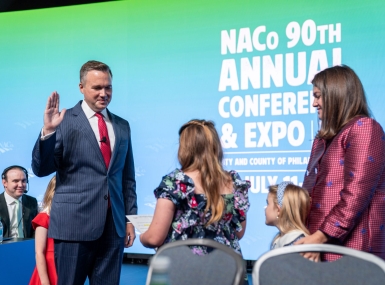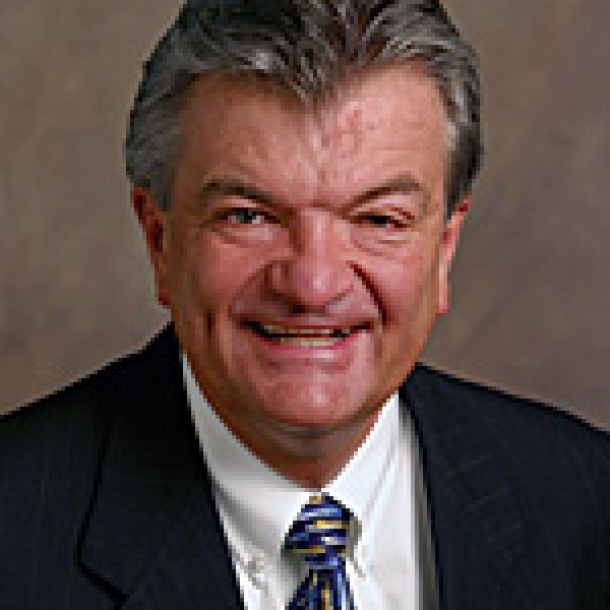Leadership Edge - July 25, 2016
Author
Upcoming Events
Related News
38 years in elected office yields solid lessons for aspiring leaders
Retiring NACo past president shares lessons from his toughest decision
When my term ends in January, I will retire after 38 years as a Hennepin County, Minn./ commissioner, a term that included a stint as president of NACo in 1997–1998.
As I clean out my 1,500 (yes, 1,500) boxes of files, I have been thinking about some of the most important and controversial issues that I championed for Hennepin County:
• Building the new Minnesota Twins ballpark
• Constructing the downtown waste-to-energy plant and extensive recycling program
• Consolidating the suburban and Minneapolis library systems
• Building the Twin Cities first light rail transit line and supporting additions
• Co-chairing the Governor’s Bipartisan Welfare Reform Commission
• Relinquishing control of our large public teaching hospital and moving responsibility for its $1 billion annual budget from the County Board to a new independent community board.
All of these issues were complex, controversial and difficult. Some included raising taxes and fees.
But I want to focus on perhaps the most controversial of all — our 2008 Clean Air Ordinance that prohibits smoking in every bar and restaurant in the county. We enacted it after more than a year of discussion and multiple hearings where hundreds of people testified, often heatedly, on each side. These are some lessons I learned about leadership as a result of experience.
1. Decide whether or not to take it on in the first place
The basic question I ask about almost everything in life is: “What are we really trying to accomplish here?” (My wife and our county staff joke that this phrase needs to be on my tombstone.) On this issue, it was clear: I wanted to improve public health and enjoyment for the vast majority of people in places that serve the public.
Next, ask, is this an issue that is really important enough for you to devote your time, energy and resources? Military strategists phrase this as, “is this a hill worthy of dying for?” Clearly, for me the Clean Air Ordinance was important and I was willing to make the commitment.
2. Go beyond the talking points
Commit to immerse yourself in understanding the issue. We commissioners at Hennepin County are full time and are fortunate to rely on an extraordinarily competent staff. I used our public health staff relentlessly, to prepare and quiz me on the science and research on this issue.
Part of this is “shock and awe” — not in the sense of military power at all, but making it clear that you are serious and know as much as or more than anybody in the room on the issue. You have to make it clear this is not a “drive-by” issue for you. This takes hard work. In order to persuade others, you have to convince them that you fully understand the issue.
3. Understand your opponents’ arguments
One of the best lessons in my life was when my high school debate coach (a very liberal Democrat) and I (then a conservative Republican) were about to debate a very contentious Minnesota ballot tax issue before a class. With 10 minutes’ notice, he told me that for “teaching purposes” we would take opposite sides in the debate. That was one of the most important teaching moments of my life.
On the Clean Air Ordinance, I made it clear that I would review all the written information that opponents would send to me. One opponent took this very seriously and regularly dropped off at my office copious supplies of documents to support her contention that tobacco smoke did not smell. I did review the documents, but even the paper was permeated with tobacco smoke smell!
4. Build coalitions
Our County Board is nonpartisan by Minnesota law. That works well for us. The co-author of our Clean Air Ordinance was the most liberal Democrat on our board. Together, we reached out to our respective constituencies. That included unions (which tended to be divided on this issue), public health advocates, our unique Clear Way Foundation that was the result of Minnesota’s separate settlement in the national tobacco settlement 20 years ago, and others.
5. Never burn bridges
Always remember, whatever the issue, opponents on one particular issue may need to become allies on another upcoming issue. Avoid personal attacks on others and try to ignore the attacks on you.
6. Leadership means different things
I know very well from my long experience with NACo that counties operate very differently in various states and even in the same state. My experience has been as a full-time elected commissioner in a very large urban-suburban county, but I hope some of what I have learned can be helpful to elected county officials elsewhere who decide to take strong positions on important and controversial issues.
7. Be flexible and remember rule #1 above
After a lot of parliamentary maneuvering, the ordinance passed, but with a delayed start date and a sunset provision. This was disappointing, but it was enough to convince our state Legislature to pass a statewide ban the following year.
Attachments
Related News
Now I know that solid waste is complicated
Custer County, Idaho Commissioner Will Naillon says solid waste removal is "one of the things that people often take for granted until it’s their job to make sure it happens... that’s the story of being a county commissioner."

Professional Development Academy and National Association of Counties launch expanded partnership to support local government leaders
Professional Development Academy and NACo expand their partnership to train 10,000 more county leaders, equipping officials with critical leadership and tech skills.

J.D. Clark is up to a Texas-sized challenge
NACo's new president got his start in county government covering meetings for his local newspaper as a high school student.
